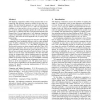Free Online Productivity Tools
i2Speak
i2Symbol
i2OCR
iTex2Img
iWeb2Print
iWeb2Shot
i2Type
iPdf2Split
iPdf2Merge
i2Bopomofo
i2Arabic
i2Style
i2Image
i2PDF
iLatex2Rtf
Sci2ools
235
click to vote
POPL
2008
ACM
2008
ACM
Imperative self-adjusting computation
Self-adjusting computation enables writing programs that can automatically and efficiently respond to changes to their data (e.g., inputs). The idea behind the approach is to store all data that can change over time in modifiable references and to let computations construct traces that can drive change propagation. After changes have occurred, change propagation updates the result of the computation by re-evaluating only those expressions that depend on the changed data. Previous approaches to self-adjusting computation require that modifiable references be written at most once during execution--this makes the model applicable only in a purely functional setting. In this paper, we present techniques for imperative self-adjusting computation where modifiable references can be written multiple times. We define a language SAIL (Self-Adjusting Imperative Language) and prove consistency, i.e., that change propagation and from-scratch execution are observationally equivalent. Since SAIL pro...
Related Content
| Added | 03 Dec 2009 |
| Updated | 03 Dec 2009 |
| Type | Conference |
| Year | 2008 |
| Where | POPL |
| Authors | Umut A. Acar, Amal Ahmed, Matthias Blume |
Comments (0)

